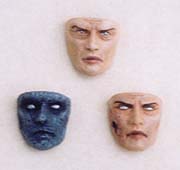The composition
instructor who would adopt James Berlin's social epistemic pedagogy or
realize Henry Giroux’s critical classroom is knowingly or not appropriating
the discourse of the Analyst. By including a hypertext pedagogy and merging
self with cyberspace—a virtual topology of master “flickering” signifiers
(Hayles 25-49) of which there is only time through a collapse of distance
(via linking)—the analyst/instructor further enables the  analysand/student
to rewrite himself/herself, to be a "posthuman" similar to the one Katherine
Hayles has so brilliantly depicted, a being who is not only beyond the
Cartesian subject and instead a cybernetic plurality “grounded in embodied
actuality” (286), but an author of "less oppressive," "less absolute"
master signifiers (Bracher 124) In this sense, hypertext
serves as a heuristic for critical self-consciousness, at once defamiliarizing
and augmenting identity, bearing results not unlike Benjamin finally torching
Brynner, refusing his cathexis—-a manufactured desire
predetermined by master signifiers—-and leaving behind, at least for the
moment, Delos’s three worlds. With a little help from hypertext,
we, too, may be as fortunate. analysand/student
to rewrite himself/herself, to be a "posthuman" similar to the one Katherine
Hayles has so brilliantly depicted, a being who is not only beyond the
Cartesian subject and instead a cybernetic plurality “grounded in embodied
actuality” (286), but an author of "less oppressive," "less absolute"
master signifiers (Bracher 124) In this sense, hypertext
serves as a heuristic for critical self-consciousness, at once defamiliarizing
and augmenting identity, bearing results not unlike Benjamin finally torching
Brynner, refusing his cathexis—-a manufactured desire
predetermined by master signifiers—-and leaving behind, at least for the
moment, Delos’s three worlds. With a little help from hypertext,
we, too, may be as fortunate.
|
|
 analysand/student
to rewrite himself/herself, to be a "posthuman" similar to the one Katherine
Hayles has so brilliantly depicted, a being who is not only beyond the
Cartesian subject and instead a cybernetic plurality “grounded in embodied
actuality” (286), but an author of "less oppressive," "less absolute"
master signifiers (Bracher 124) In this sense, hypertext
serves as a heuristic for critical self-consciousness, at once defamiliarizing
and augmenting identity, bearing results not unlike Benjamin finally torching
Brynner, refusing his cathexis—-a manufactured desire
predetermined by master signifiers—-and leaving behind, at least for the
moment, Delos’s three worlds. With a little help from hypertext,
we, too, may be as fortunate.
analysand/student
to rewrite himself/herself, to be a "posthuman" similar to the one Katherine
Hayles has so brilliantly depicted, a being who is not only beyond the
Cartesian subject and instead a cybernetic plurality “grounded in embodied
actuality” (286), but an author of "less oppressive," "less absolute"
master signifiers (Bracher 124) In this sense, hypertext
serves as a heuristic for critical self-consciousness, at once defamiliarizing
and augmenting identity, bearing results not unlike Benjamin finally torching
Brynner, refusing his cathexis—-a manufactured desire
predetermined by master signifiers—-and leaving behind, at least for the
moment, Delos’s three worlds. With a little help from hypertext,
we, too, may be as fortunate.